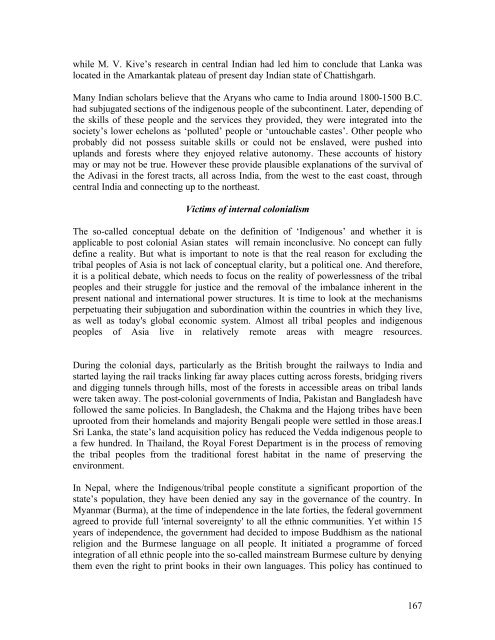Living on the Margins. Minorities in South Asia - EURAC
Living on the Margins. Minorities in South Asia - EURAC
Living on the Margins. Minorities in South Asia - EURAC
- TAGS
- minorities
- eurac
- www.eurac.edu
Create successful ePaper yourself
Turn your PDF publications into a flip-book with our unique Google optimized e-Paper software.
while M. V. Kive’s research <strong>in</strong> central Indian had led him to c<strong>on</strong>clude that Lanka was<br />
located <strong>in</strong> <strong>the</strong> Amarkantak plateau of present day Indian state of Chattishgarh.<br />
Many Indian scholars believe that <strong>the</strong> Aryans who came to India around 1800-1500 B.C.<br />
had subjugated secti<strong>on</strong>s of <strong>the</strong> <strong>in</strong>digenous people of <strong>the</strong> subc<strong>on</strong>t<strong>in</strong>ent. Later, depend<strong>in</strong>g of<br />
<strong>the</strong> skills of <strong>the</strong>se people and <strong>the</strong> services <strong>the</strong>y provided, <strong>the</strong>y were <strong>in</strong>tegrated <strong>in</strong>to <strong>the</strong><br />
society’s lower echel<strong>on</strong>s as ‘polluted’ people or ‘untouchable castes’. O<strong>the</strong>r people who<br />
probably did not possess suitable skills or could not be enslaved, were pushed <strong>in</strong>to<br />
uplands and forests where <strong>the</strong>y enjoyed relative aut<strong>on</strong>omy. These accounts of history<br />
may or may not be true. However <strong>the</strong>se provide plausible explanati<strong>on</strong>s of <strong>the</strong> survival of<br />
<strong>the</strong> Adivasi <strong>in</strong> <strong>the</strong> forest tracts, all across India, from <strong>the</strong> west to <strong>the</strong> east coast, through<br />
central India and c<strong>on</strong>nect<strong>in</strong>g up to <strong>the</strong> nor<strong>the</strong>ast.<br />
Victims of <strong>in</strong>ternal col<strong>on</strong>ialism<br />
The so-called c<strong>on</strong>ceptual debate <strong>on</strong> <strong>the</strong> def<strong>in</strong>iti<strong>on</strong> of ‘Indigenous’ and whe<strong>the</strong>r it is<br />
applicable to post col<strong>on</strong>ial <strong>Asia</strong>n states will rema<strong>in</strong> <strong>in</strong>c<strong>on</strong>clusive. No c<strong>on</strong>cept can fully<br />
def<strong>in</strong>e a reality. But what is important to note is that <strong>the</strong> real reas<strong>on</strong> for exclud<strong>in</strong>g <strong>the</strong><br />
tribal peoples of <strong>Asia</strong> is not lack of c<strong>on</strong>ceptual clarity, but a political <strong>on</strong>e. And <strong>the</strong>refore,<br />
it is a political debate, which needs to focus <strong>on</strong> <strong>the</strong> reality of powerlessness of <strong>the</strong> tribal<br />
peoples and <strong>the</strong>ir struggle for justice and <strong>the</strong> removal of <strong>the</strong> imbalance <strong>in</strong>herent <strong>in</strong> <strong>the</strong><br />
present nati<strong>on</strong>al and <strong>in</strong>ternati<strong>on</strong>al power structures. It is time to look at <strong>the</strong> mechanisms<br />
perpetuat<strong>in</strong>g <strong>the</strong>ir subjugati<strong>on</strong> and subord<strong>in</strong>ati<strong>on</strong> with<strong>in</strong> <strong>the</strong> countries <strong>in</strong> which <strong>the</strong>y live,<br />
as well as today's global ec<strong>on</strong>omic system. Almost all tribal peoples and <strong>in</strong>digenous<br />
peoples of <strong>Asia</strong> live <strong>in</strong> relatively remote areas with meagre resources.<br />
Dur<strong>in</strong>g <strong>the</strong> col<strong>on</strong>ial days, particularly as <strong>the</strong> British brought <strong>the</strong> railways to India and<br />
started lay<strong>in</strong>g <strong>the</strong> rail tracks l<strong>in</strong>k<strong>in</strong>g far away places cutt<strong>in</strong>g across forests, bridg<strong>in</strong>g rivers<br />
and digg<strong>in</strong>g tunnels through hills, most of <strong>the</strong> forests <strong>in</strong> accessible areas <strong>on</strong> tribal lands<br />
were taken away. The post-col<strong>on</strong>ial governments of India, Pakistan and Bangladesh have<br />
followed <strong>the</strong> same policies. In Bangladesh, <strong>the</strong> Chakma and <strong>the</strong> Haj<strong>on</strong>g tribes have been<br />
uprooted from <strong>the</strong>ir homelands and majority Bengali people were settled <strong>in</strong> those areas.I<br />
Sri Lanka, <strong>the</strong> state’s land acquisiti<strong>on</strong> policy has reduced <strong>the</strong> Vedda <strong>in</strong>digenous people to<br />
a few hundred. In Thailand, <strong>the</strong> Royal Forest Department is <strong>in</strong> <strong>the</strong> process of remov<strong>in</strong>g<br />
<strong>the</strong> tribal peoples from <strong>the</strong> traditi<strong>on</strong>al forest habitat <strong>in</strong> <strong>the</strong> name of preserv<strong>in</strong>g <strong>the</strong><br />
envir<strong>on</strong>ment.<br />
In Nepal, where <strong>the</strong> Indigenous/tribal people c<strong>on</strong>stitute a significant proporti<strong>on</strong> of <strong>the</strong><br />
state’s populati<strong>on</strong>, <strong>the</strong>y have been denied any say <strong>in</strong> <strong>the</strong> governance of <strong>the</strong> country. In<br />
Myanmar (Burma), at <strong>the</strong> time of <strong>in</strong>dependence <strong>in</strong> <strong>the</strong> late forties, <strong>the</strong> federal government<br />
agreed to provide full '<strong>in</strong>ternal sovereignty' to all <strong>the</strong> ethnic communities. Yet with<strong>in</strong> 15<br />
years of <strong>in</strong>dependence, <strong>the</strong> government had decided to impose Buddhism as <strong>the</strong> nati<strong>on</strong>al<br />
religi<strong>on</strong> and <strong>the</strong> Burmese language <strong>on</strong> all people. It <strong>in</strong>itiated a programme of forced<br />
<strong>in</strong>tegrati<strong>on</strong> of all ethnic people <strong>in</strong>to <strong>the</strong> so-called ma<strong>in</strong>stream Burmese culture by deny<strong>in</strong>g<br />
<strong>the</strong>m even <strong>the</strong> right to pr<strong>in</strong>t books <strong>in</strong> <strong>the</strong>ir own languages. This policy has c<strong>on</strong>t<strong>in</strong>ued to<br />
167

















